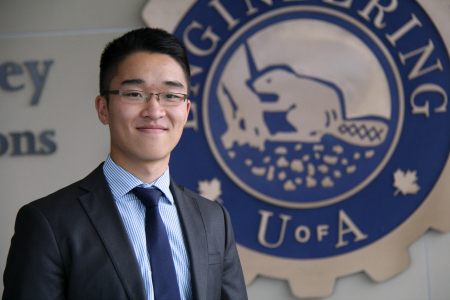
Andrew Wong says he couldn't have earned perfect grades without the support of his family, fellow students, and professors.
(Edmonton) There are a lot of calculations performed and numbers crunched on the way to earning an engineering degree. Some extremely precise. Other measures are more qualitative.
An example of the exact figures is the fact that Andrew Wong scored a perfect 4.0 grade point average, with 43 A-plus scores, three As, one A-minus and one B.
Wong's calculations are more qualitative when trying to add up those who helped him be so successful academically: there are family members, classmates and friends, professors, teaching assistants, mentors, librarians and student advisers.
"I think it takes a small village to educate an engineer," he says.
Wong is the recipient of the 2016 Henry Birk's and Sons Medal, which recognizes academic standing, character and leadership qualities.
Wong says he always had strong support from his parents, who instilled a value of education. And he feels he picked up a strong sense of curiosity and drive from his father Phillip, who graduated with a University of Alberta Master's degree in civil engineering in 1988.
Friends, he adds, make success at school possible because students often teach one another.
"There are times when you come out of a class and someone asks 'Hey, did you get that?' And you'll say 'No-I was going to ask you.' Then you all look at each other slightly terrified, but you eventually figure it," he says.
"The engineering program definitely challenges you in a lot of different ways but for me the way I got through it was first and foremost with friends and family," he says. "You suffer together with your friends, but you're working together and that really epitomizes what the engineering program teaches you, outside of the technical skills."
Wong's paid engineering co-op placements included spots at two oil and gas engineering companies and one with a biomedical startup developing new nanotech-based wound dressings.
He also took on two Dean's Research Award projects, working with Department of Civil and Environmental Engineering professor Samer Adeeb and orthopedic surgeon Nadr Jomha. The work turned into a research paper which has been submitted to an academic journal.
In trying his hand at research, he came to understand what research and academic life are like. In fact, he says his experience made him decide to pursue graduate studies.
"When you go past the technical subjects with your professors and supervisors you create mentor relationships," he says. "I asked them how they got to where they are today, and we'd have back-and-forth conversations about what academia is really like."
Wong also joined a new student mentoring program in the Faculty of Engineering last fall, called the Co-op Ambassadorship Program. He was matched with s second-year engineering student whom he mentored.
"The conversations we had were like the ones I've had with professors," he says. "I'm a couple of years ahead of him in the program and I just passed along some of the experiences I've had and advice I wish someone would have given me."
This fall, he begins a Master's degree at the University of Toronto, where he will be investigating polymer electrolyte membrane fuel cells.
Until then, he will be spending the summer at a student internship program at RWTH Aachen University. There, he is part of a biomedical devices research team that focusing its work on developing dental appliances.